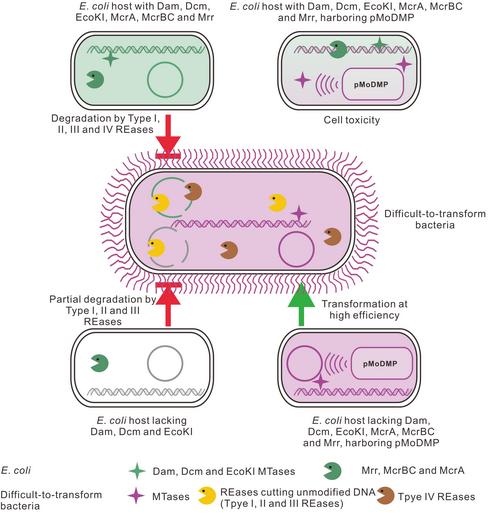Experimental genetic manipulation is instrumental in developing microbial biotechnology. To date, only a limited proportion of the laboratory culturable bacterial species are amenable to genetic transformation. Among these manipulation-friendly species, many strains are refractory to transformation by exogenous DNA. This barrier for DNA transformation is largely attributed to the presence of restriction-modification (R-M) systems in bacteria. Approximately 95% of the genome-sequenced bacteria harbor R-M systems, and 33% carry more than four REases, which makes genetic transformation more difficult.
R-M systems usually occur in pairs, i.e., DNA methyltransferases (MTases) and restriction endonucleases (REases). REases can degrade invading DNA to protect the integrity of cell’s genetic information, while MTases modify cell’s DNA to protect them from degradation by REases.
To address the hard-to-transformation problem, Prof. WEN Tingyi’s group at the Institute of Microbiology, Chinese Academy of Sciences (IMCAS) has developed a mimicking-of-DNA-methylation-patterns (MoDMP) pipeline for overcoming the restriction barrier of bacteria harboring multiple R-M systems.
24 MTases from three hard-to-transform bacterial strains, the guanosine-producing strain Bacillus amyloliquefaciens TA208, the conditional pathogenic strain Bacillus cereus ATCC 10987 and the chemoautotrophic strain Nitrobacter hamburgensis X14, were expressed in an Escherichia coli strain lacking known R-M systems and orphan MTases. After characterization of the MTases, active ones were assembled to three plasmids using the Saccharomyces cerevisiae DNA assembler and were co-expressed in the E. coli strain lacking known R-M systems and orphan MTases.
The DNA methylation patterns of the MTases co-expression strains were similar to the difficult-transform strains, and therefore the DNA methylation patterns of hard-to-transform bacteria were mimicked. Plasmids prepared in the MoDMP hosts can achieve elevated transformation efficiencies to the two Bacillus strains, and the uracil phosphoribosyltransferase gene upp was also inactivated in strain TA208 using a non-replicative plasmid prepared from the MoDMP host.
In addition, N. hamburgensis strain X14 was transformed and expressed Green Fluorescent Protein for the first time.
The MoDMP system was validated to be effective in two Gram positive chemoheterotrophs and one Gram negative chemoautotrophs. The adaptability of this pipeline to different bacterial groups suggests its effectiveness in other strains of known genome sequence that are resistant to genetic transformation.
This work has been published in PLoS Genetics (2012, 8(9): e1002987). The first author of the paper, Dr. ZHANG Guoqiang, is a Research Associate at IMCAS. The full paper can be accessed at http://www.plosgenetics.org/article/info:doi/10.1371/journal.pgen.1002987.

Model of how the multiple-RM-system containing bacteria degrading the incoming DNA and to overcome the restriction barrier of target bacteria using MoDMP (Image by IMCAS)
